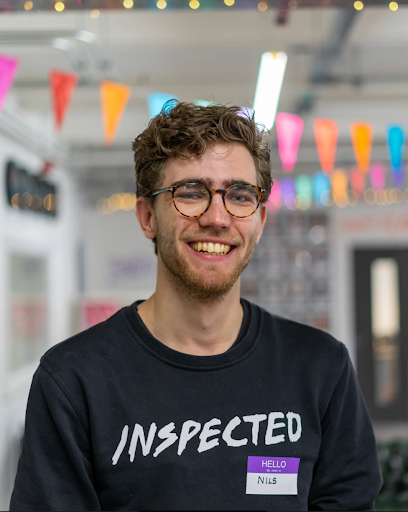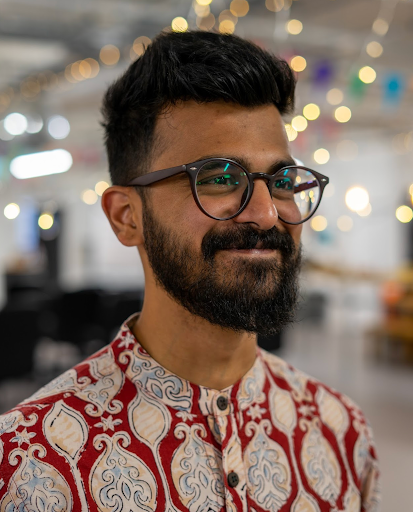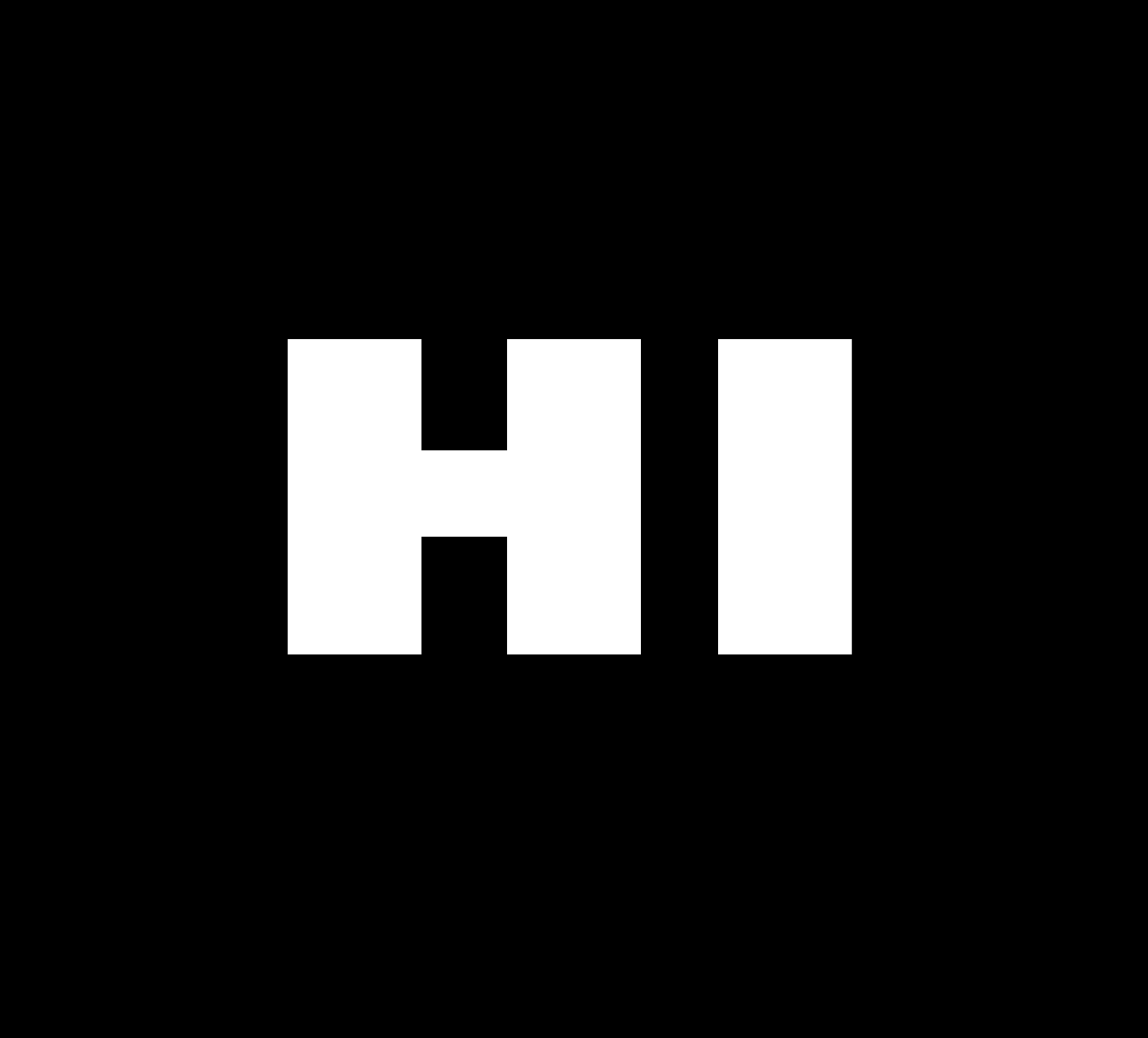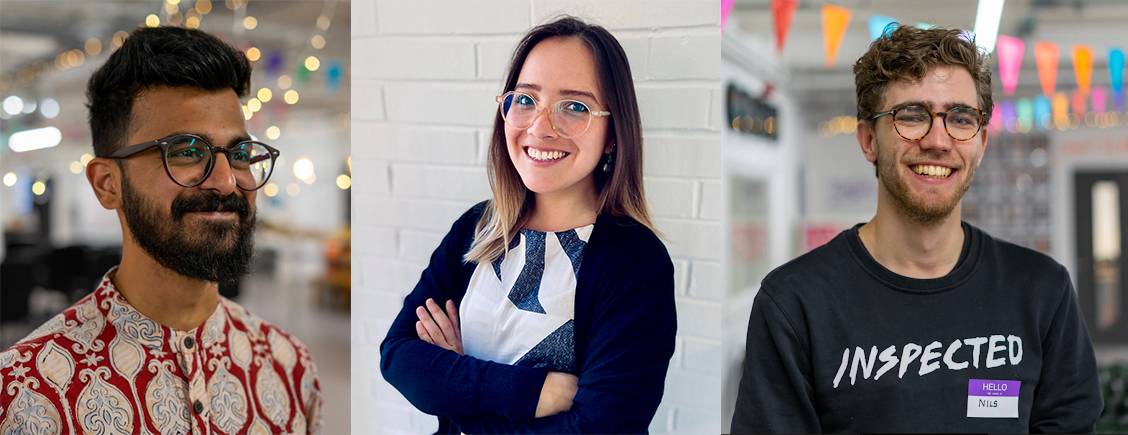Right now, a global pandemic is affecting the way we work, rest, play, and study. Right now, Hyper Island’s Digital Management & Digital Experience Design Master’s has five full-time and part-time groups studying; planning for their future careers. We talked to our full-time Master’s students based in Manchester to get a raw insight into how the lockdown has affected them.
Let’s introduce you to our students!

from Digital Management Master in Manchester. Peruvian, previously worked at Laboratoria, a latin american social enterprise. Passionate about social innovation and Hyper Island Social Impact grantee.

from the Digital Experience Design Master in Manchester. With a background in industrial design and a passion for software, he aims to explore where the physical and digital world meet. Which is what he was doing as a freelancer before joining Hyper Island. (Nils was also the resident photographer for the crew, so most of the beautiful shots in blog posts are from his wizardry).

from Digital Experience Design Masters in Manchester. He has a background in UX/UI & Communication Design, he also is renowned in the crew for his nifty lettering skills, bringing his creative penmanship to the team along with ideas, problem solving and a good ear.
In the second week of March 2020, the Hyper Island team decided to be “proactive rather than reactive” (to quote Industry Leader, Andy Young) and ran a day where everyone had to work from home, even before the thought of lockdown had become a reality.
How did that feel at the time?
AL: They were very strange days, and I had a lot of different mixed feelings. On one hand, I knew that things were going to change, and I was very eager to experiment with a remote day, approached with a learning mindset. Having the possibility to try out things and prepare proactively for something that was highly probable at the time was the best way to go.
format_quote“On the other hand, there was the feeling of “sacrificing” one of the last days that we could be working together as a team”
…so I was sad about that. Also, since it was the last Friday before pitch week, our group was going through a lot of pressure, so it was adding an extra layer of stress to what we were already experiencing.
NW: Having heard a lot from my Dutch friends, I felt like we were living in a movie. It was super surrealistic, but that made me all the more happy to try to work from home. We weren’t able to do everything from home; we were planning to do guerilla interviews that day. In the morning, we worked from home and the afternoon part of our group went out to do interviews. Later that week I worked from home, while my team was at Hyper Island. That was a very different experience. I think it’s essential that if you’re working from home, everyone in the team should.
YD: It felt a bit odd to be doing this without understanding how it is was going to be in the coming days. At the time, it felt like it was just an experiment to see if communication is possible without physical presence.
How does it feel in retrospect?
AL: Now it feels like a good decision. That first day remotely was something completely new, and when the time came to go 100% remote, we had already passed through the experience at least once. When I look back, it still feels a little overwhelming though, but I guess that’s because of the external situation that we couldn’t control.
NW: In retrospect, I’m really happy with how Hyper Island and my crew has handled remote working. Since we’re a relatively small group of people (I’m used to 300 in a lecture hall), it’s easy to make a switch like that. Not only that, I think the staff, industry leaders and crew have all been proactive.
format_quote“I have felt supported by everyone around me, and while I would’ve liked my year abroad to go differently, I wouldn’t have wanted to be anywhere else in this situation.”
The week after, lockdown in the UK started becoming a reality. You were initially going to pitch at the Etihad to City Football Group and had three days to flip your pitches online. How did you as an individual approach this and as a team/crew?
AL: From my perspective, it was a new opportunity to learn! I haven’t had the experience to pitch an idea online before (even though I had some remote work experience), and the dynamic of that meeting was all new. It was very inspiring in the practice pitch to see how all the groups approached the final pitch with different ideas to make it more interactive and engaging.”
I think we learned a lot those days. By the end I got the feeling that the entire crew were very proud of ourselves, seeing that we made it work in the end and everything went out in a good way.
YD: We just took a step back and reviewed our priorities. Team first, work second. Three of my teammates were travelling back home which caused a gap in our progress but the ones that were stable decided to pick up what was being left out. There was a huge amount of empathy and accommodative behaviour which made it easier for everyone to deal with this new situation.
format_quote“There was a huge amount of empathy and accommodative behaviour which made it easier for everyone to deal with this new situation.”
NW: Combined with this, I also moved back to the Netherlands. I wasn’t able to attend the practice pitches and wasn’t able to do much for an entire day, only two days before the deadline. However, I trusted that I could leave my team for a day, as we’d done so well in the weeks before. I’m not saying it has been my best work to date, but I’m definitely not unhappy with how it went, especially regarding how hectic that week had been for all of us.
What have been your biggest learnings from this experience?
AL: I learned a lot from pitching remotely and to start using the situation in our favor. A new range of possibilities was open and I am very happy to explore them.
format_quote“I also learned that flexibility and a positive attitude towards change is the first step to overcoming difficult moments,”
and that the support of my crew was way too important through this experience.
NW: The biggest improvement to remote work is all remotely working. It’s also good to be aware that it’s much easier to put the quieter voices down in a remote setting. As a facilitator it’s instrumental to actively ask for the opinions of these voices, give them time and space to make up their mind to share.
Infrastructure-wise, I think the right tools exist for everyone. It’s a matter of trying and implementing the tools that work for you.
format_quote“If a tool doesn’t work for you and your team, don’t be afraid to switch.”
There are many alternatives to choose from, there must be one that you’ll all feel comfortable with.
What do you think you have gained from working in this manner, how do you feel this is going to make you even more employable coming out of this time?
AL: Employability is all about how a company perceives your skills and how well they match these with what they are looking for.
format_quote“Overcoming radical change, dealing with uncertainty and being creative in a wicked environment are definitely skills that companies will value even more in the near future (if they are not already doing it).”
I think I got the opportunity to continue developing those skills during these times, thus, I and all the crew, built on that employability all the time.
YD: My most valuable learning from this experience is my ability to be empathic. My capacity of understanding people and my teammates has increased a lot. Also, with the remote working set up, I have learnt how to be productive with different working techniques like Pomodoro etc. What makes me employable is the ability to take on radical change and adaptability. I feel like all my crew, and other students who are still finishing their studies have to be commended on their ability to take on this challenge with so much positivity and resilience.
NW: Personally, I think I’ve made quite some contributions to how my team and maybe even crew works with each other. Both in technical infrastructure—suggesting software to try—as well as socially, by ensuring everyone feels included in the work we do. In my last and current team, I’ve implemented the ‘daily lead’, where each day is facilitated by another member of the team. That way everyone gets an equal opportunity to influence the way we work, and what we work on equally.
Your resilience has been incredible as a crew. What are you most proud of in yourself and the crew?
AL: The feeling of supporting and being supported by incredible people!
YD: The first thing that comes to my mind is the amazing support that everyone has been providing. The crew has been empathic, selfless and ever so supporting in this tough time. The pandemic was definitely a huge hurdle in our 6 month experience but I feel that in a way we looked out for each other even more knowing that everyone is vulnerable. Some people showed it, some did not. The support was always present. Reaching out to your friends with support is something I am proud of in myself.
NW: I’m most proud of how well everyone has been able to show their vulnerability. Sharing concerns, being anxious about the future. We have to be there for each other, especially during this period, and sharing how we feel makes it all the easier to empathize with the people around us.
And what do you miss most!
AL: Being in person, together, sharing teamwork, but also our day by day.
YD: The Studio. The people. I just miss the energy that I could soak in from 28 other amazing people. When I look back, I see the days that could have been. So many bar hops, so many team lunches that could have been. Many travel plans that had to be let go off. Even though this situation has helped us get prepared for a new future, I miss the possibility of having a great time with my crew, sharing a beer and some stories in a park.
NW: I can’t say I really miss a particular thing or activity. What I miss most is not having to worry about whether going outside is essential or not, feeling free in how I am and go. I do, however, miss those “watercooler moments” we used to have in the studio. Talking over lunch with my crew about personal life, planning parties, sharing our passions and our disappointment in UK bread.
How do you feel Hyper Island has equipped you for a post pandemic workforce?
AL: One of my principal developed skills in these crazy times is the ability to be flexible towards change, adapt and deliver a product that adds value. These days, we cannot be certain of what the world is going to look like in the next few months, so if that ability is present, you can trust that the person will deliver value in the best way possible.
format_quote“I believe that the skills we develop at Hyper Island are the type of skills that are going to be most valued in the post-pandemic workforce.”
Another very important perspective that I’ve grown in is the human side of the process. During the pandemic, all of us have had very difficult days, and knowing that your team is there for you, supporting whatever needs to be supported is comforting. Also, the dynamic of the team was very interesting to create, because all of us consider each other’s energy every day and we adapted our work to what was needed—without judgment.
Finally, I think that Hyper really embraced the change and I love how we have been more exposed to people and organizations that were not necessarily local, having people connected from the US, Sweden, and Spain (that I can remember). I think that exposure has been very rich, and it’s a good way to see that there has been a value trade-off (in-person sessions vs. access to anywhere-in-the-world sessions). If you see it that way, the world is open in a totally different way, with lots of possibilities to explore.
YD: Hyper Island provided us with an opportunity to be the breed of students no one has ever seen before. Being able to complete a Masters designed for maximum human contact over a laptop screen with the same outcome and learning is something which is crazy if you think about it. In retrospective, I feel that Hyper Island has lived up to the “ideals” like Lead the Change, Real World Ready and Team is Everything. These qualities for me are important and I believe that Hyper has allowed us to take on the change and be successful in something that no one could have prepared for.
NW: Hyper Island’s focus on teamwork and team happiness have been just as helpful before as after the switch to remote work. I think that focus has been the biggest improvement to the way we work remotely together.
format_quote“As a result, I not only feel comfortable taking part in a remote working session, I feel comfortable leading one!”
This is part one in a series of interviews with the students on how they have adapted to this new reality and the grit and resilience they have all shown.


